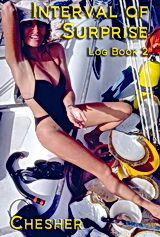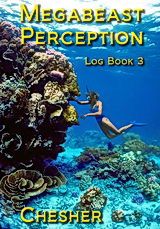Vote for Freedom
At the top of the stairs from the Bateau Chateau a gigantic, chauffeur driven, black Mercedes Limousine from the TV studio waits for me. I get in and off we go to the Lion Park Safari. I sit alone in the back seat and, all the way out through the used car lots and the cow pastures I agonize about what "The Wanderer" is doing. The Oracle was certainly right about a surprise waiting for me on Saturday. Now I've got to follow the rest of its advice to the letter.
The Mercedes glides into the parking area of the Lion Park Safari and I look around. Surprise, surprise, surprise, there is no demonstration, no Estelle, nothing but the usual Saturday crowd of people wandering lethargically around. Well, I might have known she'd screw it up. It turns out I am the demonstration, just little old me all by my lonesome.
The TV crew has its cameras set up around the dolphin pool downwind of the ripe quano smell of the penguin cage. As I walk into the grubby arena everyone goes silent. I see Smarmington-Beaker, the Vet Dr. Hide, and the Curator of Fishes Dr. Smyth all standing together, thick as thieves.
Genene and a man, another trainer, are standing apart from the trio. Genene's eyes are red and filled with tears. I take a deep breath and instantly regret it. The air is a mixture of artificial sea water seasoned with chlorine and dolphin shit. This combines unmercifully with the odor of hot penguin guano, dusty lion dung, and ripe fish. No wonder Genene's eyes are red.
Genene stomps over to me in her yummy white short-shorts and little rubber booties. The cameramen ogle on avidly, fumbling with their cameras, as she sobs, "Why are you doing this?" and I feel like turning around and walking out again. But I look into her eyes and wonder about the stresses I see in there. Although it's brutal and makes me feel even more of a shit, I shrug and sadly say, "Ask Squeek."
Her hand flies to her mouth and she lets out a whole flood of tears. The other trainer steps up and looks like he might get violent. Good TV footage. He yells, "You damn fraud! You don't know bloody piss all about dolphins!"
Smarmington-Beaker glides over like a lemon shark and oozes me away from them. He gets a snide look on his face and in clipped, precise British accent, warns me, "Dr. Chesher, here in Australia we have excellent laws which protect individuals and firms from libelous statements." Up go his aristocratic eyebrows and I get a scenic tour of his hairy nostrils, "I suggest you be very careful what you say in front of the camera as Mr. Bulley and his partners are fully prepared to have you and the television station sued should you say anything our lawyers consider libelous."
"Get off it, Smarmy. A libel suit would hurt you more than it would hurt me. Lots of bad publicity isn't what an entertainment park needs, is it?" I have another line of attack planned anyway, but why tell him in advance?
The film crew gets their act together and the opposition goes on first. Smarmington-Beaker postures before the camera and greases into a well rehearsed, well spoken PR script about how the facility was designed by England's finest experts. First he bores everyone into a state of stupefaction by going over the filter system of the swimming pool. As he pontificates, I remember seeing a photograph of a dolphin in a glass tank only inches bigger than it was. The tank was in Piccadilly Circus in London. The dolphin was barely alive, covered with sores, unable to see out of its clouded eyes. Maybe Bulley hired the same dolphinarium designer.
"The dolphins get constant medical care from Sydney's best veterinarian." Smarmington-Beaker passes the wand of authority to the illustrious Dr. Hide from the University of Sydney. Hide puts on his best Sheep Doctor face and tells the camera the dolphins are inspected at regular intervals and given all the required vitamins and medicines to keep them healthy. The water in the pool is monitored daily to maintain the proper balance of chemicals. Next Dr. Smyth comes up to bat as Sydney's greatest zoo authority to tell the audience the pool is more than adequately sized. He concurs with Mr. Smarmington-Beaker the pool is very well designed.
Well, Dr. Chesher? The microphone and the cameras are on me.
"We have just heard three of Sydney's prominent men assure us this circular cement swimming pool, 40 feet in diameter and 12 feet deep," I walk down the bleachers and sweep my arm over the pool, "was designed by experts and is perfectly adequate to maintain up to 16 dolphins." I let this float for a beat as I look at the pool in amazement. I turn to the camera and shake my head.
"The science of holding dolphins in captivity is not a new one and engineering a pool to keep dolphins alive for a time is not an especially challenging task. But the study of dolphins, their natural history and behavior in the wild, is a brand new field where discoveries are being made every day.
"Most veteran dolphin scientists who have studied dolphins in captivity during the past decade now believe they have learned as much as is needed about dolphins in a captive state. These scientists are now learning about dolphins in the wild and it is here the breakthroughs in dolphin science are being made." I kneel by the pool so the camera will catch the dolphins in the background.
"Research scientists who study the complex social life of wild dolphins have learned the dolphin families swim for miles in the sea on an average day. Their lives in the ocean are unbounded and highly complex. Their daily activities are filled with adventure and playful joy. They eat a varied and interesting diet and have extensive social activities associated with the catching and eating of their food." One of the dolphins comes up near me, right on cue.
"Dolphins see underwater for long distances using their sonar. They put out a sound and its echo gives them a vision of what is around them. If one dolphin, sonar clicks a fish and sees it by its echo, all the other dolphins in the family see the same fish by the same echo creating a kind of communication/vision our species finds difficult to even think about. Their world is one of sound. When their whole community sings, they illuminate the sea with all its wonders."
I turn again and look down at the pool. The dolphin has glided over to hover just a few feet away from me. I hold out my hand and it swims a little closer. So far, nobody has interrupted me. "So I wonder, when I look at the three dolphins remaining from the many who have died in this small cement hole in the ground, I wonder what it must be like for such wonderful creatures to be taken from their complex social communities, taken away from their families - their parents - their children -and put into this pool at the Lion Park Safari, 40 kilometers inland from the sea." I look into the camera and point at the pool.
"I wonder what it must be like to die in there as have 12 dolphins before them. How do you think these three dolphins must have felt, a couple of months ago, as they watched the youngest one, Squeek, die?
What were they thinking when they watched Genene arrive in the morning to find Squeek dead in the pool?
How did they feel as the dolphin's stiff, lifeless body was pulled out of the water?
What did their sonar show them?
What did the water taste like filled with the death of the younger dolphin? I hesitate to let that sink in.
How did the dolphin Sally feel - what was she thinking last December - when she drowned her own baby just after it was born into this pool? Why do you suppose an intelligent, loving creature like a dolphin would do such a thing? Come, you don't need to be a scientist to understand such a dramatic gesture."
"I won't argue with Dr. Hide and Dr. Smyth about the mechanics of this swimming pool. The issue before the people of Sydney is not a technical one, not an issue of how well the designers worked out the plumbing of the swimming pool, not an issue of how often a vet comes to look at the dolphins or haul them off to the autopsy table, not an issue of technical adequacy....it is a question of moral adequacy." The camera has moved in on me, close. Good.
"Indeed, science and technology can be brutally cold and unconcerned with what is morally right or wrong. It is one of the things all of us worry about these days. Science and technology, presented by Sydney's finest scientists of undeniable qualifications, have established these facilities can keep dolphins alive for a time. That's fine, I don't question that. But that's not the question, not the issue that bothers me and, I hope, will disturb you as well. This is the issue..." I pause and move closer to the camera.
"Do we humans have the right to capture dolphins and imprison them in a bleak little hole in the ground so we can enjoy their circus performances three times a day at $4.50 per person? Doesn't it seem wrong to you, the people, for us to allow dolphins to be killed and injured during capture, to allow dolphins to die from stress related diseases, to take dolphins out of the world where they are so perfectly adapted, to rip their families and their lives apart because we LOVE them?" I step back and point to the dolphin in the pool.
"When I see dolphins in the wild, I don't fear them and I'm not indifferent to them, I feel an unbidden affection for them - a feeling mankind has shared with these creatures since the dawn of time. I feel wonder and amazement and delight when I see them." I walk slowly up the bleachers towards Smarmington-Beaker, Dr. Hide and Dr. Smyth. "Although I respect these three learned men here, these men who are captors and killers of dolphins, I do not agree with their moral or professional position." I address the trio, "So, in your professional opinion, this 40 foot diameter swimming pool is just fine for holding those three dolphins? Even 16 dolphins? I propose an experiment. Let the dolphins go, drain the pool, and lets put the three of you into the hole in the ground and keep you there doing circus tricks three times a day for your meals. How long would you suppose you'd find the facilities adequate?



